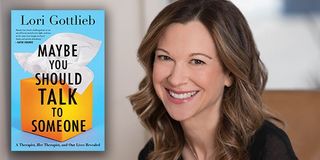Parenting
The Stories We Tell Ourselves
An interview with therapist and author Lori Gottlieb.
Posted April 2, 2019
After reading Maybe You Should Talk to Someone by therapist Lori Gottlieb, I could not wait to chat with her about the stories we tell ourselves and the impact this has on our lives. Her new book is equal parts informative about the therapy experience and insightful about the process of getting to know ourselves in meaningful productive ways.
Lynne: Can you tell readers about the book in your own words, and what you hope most resonates with people who might be considering talking to someone?

Lori: The book is a behind-the-scenes look at what goes on in a therapy room with people who are struggling with all kinds of different issues. It’s about what happens when a therapist goes to a therapist and needs to work through something in her own life. I hope the book demystifies the therapy process. I think people have a lot of ideas—maybe from media or if they've met somebody who's gone to therapy—yet they don't really know what therapy is. I hope my experience makes it less scary or mysterious, and I also hope that even for people who don't go to therapy, that it helps them see themselves in the people I write about. That it helps them to see patterns they may not be aware of in their own lives, by reading about other people's experience of working through that.
Lynne: I particularly liked the storytelling nature of the book so my next question is about the patients that you chose to highlight. As a counselor myself, I imagine you had some difficulty deciding who you might want to highlight. What I noticed were that the people you did choose had varying degrees of self-awareness. I wonder if you could talk a little bit about why people have varying degrees of self-awareness and then, why therapy is a safe place to dig into that.
Lori: I think that when we don't look at something, it's in the service of protecting ourselves. If something feels particularly uncomfortable or threatening to somebody, they may not want that to be in their awareness. What's tricky about that is that it's not necessarily a conscious decision whether or not to put it in our awareness. It's one way we—without even realizing it—keep ourselves safe.
But the safety is an illusion, because the more we try to tamp down these uncomfortable feelings, or even these behavioral patterns that maybe we don't want to look at, the bigger they get. I think about it in terms of the way we think about emotional health versus physical health. When it comes to physical health, if we're having a little chest pain or something feels funky in the body, maybe we'll be in denial for a little bit, but certainly we're a lot quicker to go to the doctor.
What we do with our emotional health is tell ourselves that it's not a big deal. Maybe I don't really want to feel so I'll go on the internet or have a glass of wine or engage in some destructive patterns—whatever the distraction is—so that I don't have to deal with these feelings.
People with very little self-awareness often come into therapy if they have a big crisis. And if they have more self-awareness, they're coming because something doesn't feel right. They may not be aware of what it is, but they want find out.
Lynne: I often wonder if that's because we’re taught from early ages that the intense negative emotions are bad and intense positive emotions are good. This good-feelings versus bad-feelings kind of thinking interferes with us tuning in to ourselves. That if we're angry, there is a reason. If we're sad and sorrowful, there's a reason. That those emotions may not feel good but they aren’t inherently bad.
Lori: Right. I think when people come to therapy, often they're saying in not so many words, "Help me not to feel. I'm still grieving after five years. Help me not to feel this. I feel anxious—help me not to feel this. I feel sad or angry—help me not to feel this." What they don't realize is, that you're going to feel these feelings. It's part of being human, and how you tolerate those feelings, and what information those feelings give you is very important. Our feelings are like a compass; they’re useful. They help to guide us in certain directions. I also think that if you're going to cut off your feelings, you're going to cut off all of them. If you mute the pain, you're also going to mute the joy.
Lynne: Exactly. In fact, I tell my clients that when the more intense negative emotions are happening, they're often telling you something about your life that is changeable. Parents come to me for assistance with understanding their children—often deemed challenging. But frequently I find there are a lot of parents would like to change about their response to their children. Their parenting experience is of course impacted by their children’s unique style of learning, their ways of being in the world. They may be really persistent or intense, or anxious; perhaps distractible or sensitive. But everyone has a parenting style too, and this predominant way of responding to children can either be reactive or passive, rather than positive and active. Or sometimes their lifestyle is going too fast, stressing them and their children out. There may be a lot of family conflict around the life they're trying to live.
While my focus is on parent education, often I uncover bigger, deeper problems within the family, or bigger, deeper problems the person who sought me out is only beginning to contend with.
Lori: It’s true that parenting will bring us face-to-face with all of the unresolved issues that we thought were resolved. All of a sudden, you're dealing with your child, and they all come out.
Lynne: For some, if they start by focusing on their parenting, sometimes this feels like the safest way into a therapeutic relationship. Can you talk a bit about the difference between therapy and counseling?
Lori: This brings up what I talk about in the book about presenting problems. People will come to therapy with a sort of a concrete problem. Like a parenting issue or I'm not happy in my job or my husband and I keep arguing about this one thing and we can't make a decision about where to live or, whatever it is. It's the point of entry.
Counseling centers around the problem that they're coming in with, and solving that problem. Therapy is a more wide-ranging exploration of the person's life. It’s the deeper work of looking at what's going on in your inner life. What are some of the historic ways of being that maybe aren't working so well anymore? That's therapy.
Lynne: In the book, you describe having rich and meaningful friendships, and some really great collegial relationships at your office. How does having a therapist benefit a person when they already have supportive people in their lives?
Lori: There's a big difference between what friends do and what a therapist would do. Partly because therapists have the vantage point of not being in their lives. Friends do all kinds of wonderful things, but often will not really bring something to your attention that they think might make you feel criticized or might make you uncomfortable, or that you might perceive as being unsupportive. Even though the friend is being very supportive in his or her honesty.
Therapists have a different orientation, which is, we hold up the mirror and say, "Here's your reflection." We do it in very compassionate ways but also want people to see more clearly their ways of relating in the world, in a way that a friend either can't see because they're too close or because they're too invested, or because they're not trained to see it.
Lynne: One thing I noticed in the stories you chose was a through-line of loss. Some of the stories had to do with a past loss, but some had to do with anticipating loss, or the loss of what might not ever be. I thought it really profound to think about loss as not only as those things that have already happened to us, but the things that we imagine won't. Why is loss a theme in the stories?
Lori: Loss is a part of life. So many of us try to avoid it because it can be extremely painful. In past loss, the fact that you loved so deeply, is why you feel that loss so deeply. You can't have one without the other. If you're going to love and be loved, there is always the possibility of loss. But the alternative is not to love and be loved. To not get too invested. It's a strategy for a lot of people, but they end up feeling very lonely using that strategy.
In anticipatory loss, people often won't take risks or try things because the fantasy of how deeply they will be hurt if they don't get what they already don't have, but want very badly, makes them shut down.
Lynne: I'm fascinated by your career path to therapist: Television, journalism, medicine. The common thread being story. Years ago, I turned to writing fiction to explore complicated loss. I needed a reflective, creative outlet, something just for me. So I started writing novels, and it’s changed the way I understand myself and others. I wonder if you could talk a bit about how you help people to tell their own stories. In what ways do the stories we tell ourselves impact the way we live?
Lori: All of the careers I've had, even though I didn't realize it at the time, have been about story and the human condition, tackled from different angles. There was Hollywood, which is about fictional people, though very moving stories. There was medical school, which was about very real stories. Journalism, which was telling other people's stories, and now therapy, which is helping people to change their stories.
Stories help us make sense of ourselves in the world; we've always made sense of what's happening to us through story. We tell stories to talk about our lives. And stories are another way for people to connect.
But a lot of the stories people create are in a lot of ways faulty narratives. There's something going on that's holding them back, and they don't realize that it’s the way they're telling themselves the story. I feel like I'm almost an editor sitting in the therapist's chair, because I'm listening to the content of the story, but I'm also very curious about how flexible the person is with the story. I know I'm hearing it through a particular lens and that the lens might be too narrow or skewed. A lot of stories people come in with are things like I'm unlovable, or nothing will ever work out for me or people don't understand me. I think when they start to edit that story a bit, looking at the present and how that story fits into their current circumstances, they start to really broaden the possibilities for their life. For what their future story might look like—and even what their present story might look like.
Lynne: I really love the idea that the point-of-view that people have on their story is sometimes so close they're missing details of the narrative that might help them see things differently, right?
Lori: Yes. I help them to zoom out and see what the other "characters" in their stories might be saying. What might be their perspective? Can they imagine if the story were another way? If so, could they hear or get curious about the other person's perspective? What might they experience in their interactions? How might they see things differently? Is there a nugget of something useful in that that could help to edit your story?
Lynne: What advice do you have for someone who might be on the fence about seeking out a therapist? How would you encourage them to make this decision?
Lori: I would say that the first session is really a chance for you to see what it's like to sit in a room with a therapist. It's not like you walk in the room and you've signed up for therapy; people get really worried about that. That somehow if you go once you're committed to doing something you're ambivalent about, or not sure that you're interested in. Most therapists treat a first session as a consultation. Our interest is in the client, so if somebody doesn't feel like it's the right fit, or they're looking for something else, or we feel that we're not the right person to help them, we aim to get them to the right person.
I'd also say that if you're curious about therapy, you can try it for as long as you want, and you can just see what the experience does for you.
Lynne: I totally agree. I always tell people that if you're on the fence, maybe you should talk to someone. Acknowledge your contemplation of it.
Lori: For people on the fence, there is something they want to talk about, and the therapy room is the rare place where you can sit with another person for 50 minutes, and there are no screens, nothing is beeping, there will not be any distractions. It's incredible what happens in that space—being in a room with someone who is listening, understanding, paying attention. That alone is a unique experience in today's world.
____
Lynne Reeves Griffin RN, MEd is the author of the parenting guides, Let's Talk It: Adolescent Mental Health and Negotiation Generation. She is also the author of the family-focused novels, Girl Sent Away, Sea Escape, and Life Without Summer. You can find her online at her website, or follow her on Twitter @Lynne_Griffin.



